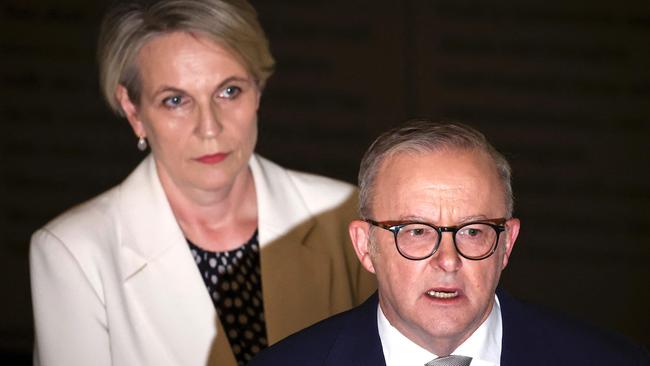Tanya Plibersek’s ‘irrelevant considerations’ questioned in Blayney mine battle
Tanya Plibersek’s court battle over the Blayney mine will see her accused of misusing heritage law to pursue an environmentalist agenda in a decision rife with ‘irrelevant considerations’.

Mining conglomerate Regis Resources will argue Tanya Plibersek’s decision to partially block the Blayney goldmine development in NSW was riddled with “irrelevant considerations” and used Indigenous cultural heritage as a trojan horse for environmentalism, court documents show.
Regis outlined the crux of the case it will take to trial in an originating application for its judicial review of the McPhillamys goldmine heritage decision, provided by the Federal Court to The Australian.
Regis, through its subsidiary LFB Resources, took the Environment Minister to court last month in an effort to bring its $1bn development back on track, arguing it was left paralysed by Ms Plibersek’s declaration that its tailings dam would desecrate sacred Wiradjuri waterways.
An interim measure from the developer calls on Ms Plibersek to “produce all documents that were before” her prior to a final judgment. If granted, it would lay bare her previously opaque consultation with the applicants behind the decision: artist Nyree Reynolds and the Wiradyuri Traditional Owners Central West Aboriginal Corporation.

The revelations signal the Blayney mine veto will continue to shadow Ms Plibersek for months to come and add to the pile of controversial calls that has made her a target for the Coalition going into the next federal election.
Ms Plibersek will have to deal with a potential legal battle with Regis as she also tries to resolve the future of salmon fishing in Tasmania. That looming decision has led Anthony Albanese to publicly contradict her and fuelled Labor concerns that her actions could lead to the loss of crucial Tasmanian seats at the upcoming federal poll.
In the Blayney dispute, central to Regis’s argument will be the Department of Climate Change, Environment, Energy and Water’s failure to enlist the help of an independent assessor to evaluate evidence given late in the consultation process.
Ms Plibersek’s choice to scuttle the development hinged on it threatening the blue-banded bee Dreaming, a piece of intangible evidence relayed to her by members of the WTOCWAC in December 2023, after the majority of evidence had already been interrogated. In Senate estimates, DCCEEW staff said the Dreaming was never independently assessed.
“The failure to treat claims raised by the second respondent and/or third respondent (Ms Reynolds and the WTOCWAC) after 4 May, 2022 as a new application … and/or to seek a new or amended report … (meant) the minister’s decision was legally unreasonable,” the application reads.
“The minister did not have power to make the declaration because a statutory precondition to the exercise of that power, being the receipt of a “report” (by a heritage assessor) … was not satisfied. (Regis) was denied procedural fairness, in that it was not provided with, and afforded an opportunity to comment on, information upon which the minister relied in making the declaration.”
At trial, Regis will argue Ms Plibersek failed to consider the “substantial, clearly articulated arguments” of the Orange Local Aboriginal Land Council, who disputed evidence given by the WTOCWAC.
It also took issue with her reliance on a previous heritage decision blocking the Wahluu Mount Panorama go-kart track, which was made by former environment minister Sussan Ley and also relied on disputed WTOCWAC evidence.
“The minister took into account an irrelevant consideration, and acted in a legally unreasonable manner, by having regard to the (past decision),” the document reads.
“The result of the minister’s exercise of the power to make the declaration … is so uncertain as to render the declaration invalid.”
While heritage applications are designed to determine the Indigenous significance of natural sites, Regis contends the process was unfairly used to question the mine’s environmental credentials, which had already been vetted through previous state and federal processes.
“The minister took into account an irrelevant consideration, being the potential environmental impact of the project on the Belubula River,” the application reads.
“(She) failed to consider substantial, clearly articulated arguments to the effect that the declaration would make it unviable to carry out the approved project and also create a significant risk that it would be unviable to carry out an alternative mining project within the specified area.”
No court date has been set for the matter, but Regis has previously asserted it could overturn Ms Plibersek’s decision and restart the mine development process within the next year if successful, compounding environmental pressures on the Albanese government as it prepares for the election.
Ms Plibersek already faces scrutiny for delays on contentious environmental decisions like the legality of Tasmanian salmon farms and forestry projects.
Under the judicial review, Regis seeks to have the Blayney decision repealed and for a re-examination of the evidence to be handled by a different Labor minister within the DCCEEW.
It is also seeking legal costs from Ms Plibersek, though it will not ask the same of Ms Reynolds and the WTOCWAC, who are listed as additional respondents in the matter.
Regis is represented by Ashurst Legal, a multinational specialist in corporate law, while Ms Plibersek has enlisted the equally formidable Clayton Utz, a major firm that regularly serves government clients.
Reynolds and the WTOCWAC have hired solicitor Ross Mackay and environmental law firm Stringybark Legal.

Justice Geoffrey Kennett is the appointed case management judge for the case.
The Blayney decision was Ms Plibersek’s first heritage approval under Section 10 of the Aboriginal and Torres Strait Islander Heritage Protection Act since assuming office and comes amid a call for expedited reform of heritage laws. A court win for Regis would set precedents for the handling of future assessments.
Upon launching its case against Ms Plibersek, Regis chief executive Jim Beyer bemoaned her disregard for the “clear consequences for the project of making such a wide-ranging and indiscriminate declaration”.
“None of the extensive expert evidence produced during the years-long processes we went through to approve the McPhillamys Project and respond to the Section 10 Application indicated there was Aboriginal cultural heritage that could not be appropriately managed,” he said.








To join the conversation, please log in. Don't have an account? Register
Join the conversation, you are commenting as Logout